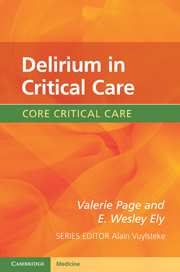Book contents
- Frontmatter
- Contents
- Foreword
- Delirium, a patient testimony
- 1 What is delirium in critical care?
- 2 How common is delirium in critical care?
- 3 What does delirium look like in critical care?
- 4 Delirium in critical care: how does it happen?
- 5 Delirium: what causes it? Risk factors
- 6 Delirium in critical care: why is it important?
- 7 Delirium in critical care: how do we diagnose it?
- 8 How to prevent delirium?
- 9 Treatment of delirium in critical care
- 10 Mental capacity and restraints
- 11 End-of-life care
- 12 What is the future?
- Selected references
- Index
- References
10 - Mental capacity and restraints
Published online by Cambridge University Press: 05 December 2011
- Frontmatter
- Contents
- Foreword
- Delirium, a patient testimony
- 1 What is delirium in critical care?
- 2 How common is delirium in critical care?
- 3 What does delirium look like in critical care?
- 4 Delirium in critical care: how does it happen?
- 5 Delirium: what causes it? Risk factors
- 6 Delirium in critical care: why is it important?
- 7 Delirium in critical care: how do we diagnose it?
- 8 How to prevent delirium?
- 9 Treatment of delirium in critical care
- 10 Mental capacity and restraints
- 11 End-of-life care
- 12 What is the future?
- Selected references
- Index
- References
Summary
Catherine, 29, daughter of a doctor, suffered from severe asthma. She knew her illness well and while her attacks came on quickly she rapidly recovered and had never required intensive care. One Sunday morning she had a severe attack, her sister persuaded her to go to hospital on the understanding she would only be given oxygen. At the hospital she was given oxygen and a nebulizer which she said gave her a headache and she decided to leave the hospital. The clinical team looking after her were horrified having decided she needed intubation and ventilation from blood gas results. The emergency doctor contacted Catherine's father who asked her to wait until he arrived. In the meantime Catherine's condition improved and she tried to leave the hospital with her sister. She was taken back to her room, placed in four-point restraints and after 45 minutes was anaesthetized and intubated. The clinical team said later that after she was prevented from leaving she became more confused and combative, refusing treatment. She made a rapid recovery and was discharged the next day. Following this she had nightmares, cried constantly, was unable to return to work for several months and swore never to go back to hospital. Two years later she had another severe attack and became unconscious. Her brother called an ambulance and she was taken to a nearby hospital where she died after unsuccessful medical treatment.
(Adapted from Annas.)- Type
- Chapter
- Information
- Delirium in Critical Care , pp. 180 - 190Publisher: Cambridge University PressPrint publication year: 2011

